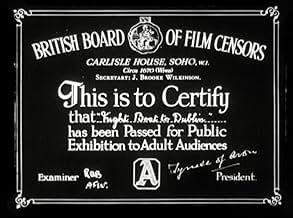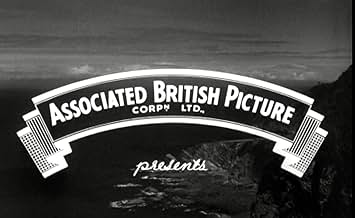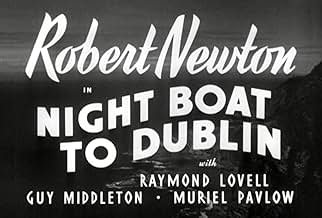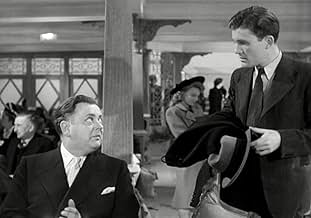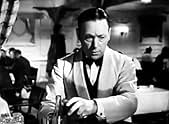IMDb RATING
6.2/10
475
YOUR RATING
The allies plan to rescue a Swedish atomic scientist from under the noses of the Nazis.The allies plan to rescue a Swedish atomic scientist from under the noses of the Nazis.The allies plan to rescue a Swedish atomic scientist from under the noses of the Nazis.
Scott Forbes
- Lieut. Allen
- (as Julian Dallas)
J. Hubert Leslie
- Ticket Collector
- (as Hubert Leslie)
Featured reviews
This 1946 British film is very much in the mould of John Buchan's 39 Steps, filmed in 1936 with the stylish Robert Donat, and as well the Ashenden stories. In all, the heroes had brains and style. This too is fairly exciting but not in the league of the others.
It perhaps is not obvious now but in just-post-war austerity rationed Britain, the Robert Newton character, as too his colleagues, is extremely well and stylishly dressed - the over-coats especially. Only the wealthy, film-stars or a gangster would have dressed like this at that time. Newton too is not simply stiff-upper lipped, he gives the character the full charismatic beans: low-key, cool and brave marks him as a man and a hero apart. Clever, resourceful, undaunted, stylish - this was the last call for the British filmic hero-star. It was the world of Ian Fleming as he would like it to be seen. (Bond on film was never obviously clever - it was the gadget which usually saved him).
From this time onwards, the hero who could out-think, out-drink and out-punch the enemy, and always get the girl, was imported principally from USA. Brits in British productions became reduced to supporting roles. If male, if a goody then slow-witted, loyal and liable to get shot. If baddies, clever but fatally flawed. If female, beautiful and life-long loyal to the hired-in hero. Bond marked a change but was never persuasively intelligent.
This film however has Newton as the brilliant brave Hero. Even Guy Middleton - perennial film drunken waster -gets a makeover in the brain and bravery departments. Like its wartime predecessors - the baddie often played by Raymond Lovell, who seemed to specialise in being something of a pushover though as here. Newton, as all heroes do,gets the girl - here the lovely Muriel Pavlow.
It perhaps is not obvious now but in just-post-war austerity rationed Britain, the Robert Newton character, as too his colleagues, is extremely well and stylishly dressed - the over-coats especially. Only the wealthy, film-stars or a gangster would have dressed like this at that time. Newton too is not simply stiff-upper lipped, he gives the character the full charismatic beans: low-key, cool and brave marks him as a man and a hero apart. Clever, resourceful, undaunted, stylish - this was the last call for the British filmic hero-star. It was the world of Ian Fleming as he would like it to be seen. (Bond on film was never obviously clever - it was the gadget which usually saved him).
From this time onwards, the hero who could out-think, out-drink and out-punch the enemy, and always get the girl, was imported principally from USA. Brits in British productions became reduced to supporting roles. If male, if a goody then slow-witted, loyal and liable to get shot. If baddies, clever but fatally flawed. If female, beautiful and life-long loyal to the hired-in hero. Bond marked a change but was never persuasively intelligent.
This film however has Newton as the brilliant brave Hero. Even Guy Middleton - perennial film drunken waster -gets a makeover in the brain and bravery departments. Like its wartime predecessors - the baddie often played by Raymond Lovell, who seemed to specialise in being something of a pushover though as here. Newton, as all heroes do,gets the girl - here the lovely Muriel Pavlow.
Robert Newton plays an MI5 man who infiltrates a gang of Nazi agents involved in the capture of a Swedish scientist whose work on developing the Atom bomb is being smuggled out via neutral Ireland. The eponymous night boat plays an important part in the early part of the story though most of the film takes place in England.
Not a film of any great depth, its intricate plot and considerable amount of dialogue is directed with speed and skill by Lawrence Huntington, adroitly steering around several implausibilities in the plot. There are likable performances from Robert Newton, and the admirable Raymond Lovell, who seemed to appear in every other 1940s British film, gives a typically urbane performance as the chief villain; John Ruddock is creepily sinister as his secretary. Newton is assisted by the jaunty Guy Middleton, and the pair get away with several double entendres.
With superb black and white photography by Otto Heller, it's a ripping yarn from a bygone age of trilby hats, clipped accents, and British pluck.
Not a film of any great depth, its intricate plot and considerable amount of dialogue is directed with speed and skill by Lawrence Huntington, adroitly steering around several implausibilities in the plot. There are likable performances from Robert Newton, and the admirable Raymond Lovell, who seemed to appear in every other 1940s British film, gives a typically urbane performance as the chief villain; John Ruddock is creepily sinister as his secretary. Newton is assisted by the jaunty Guy Middleton, and the pair get away with several double entendres.
With superb black and white photography by Otto Heller, it's a ripping yarn from a bygone age of trilby hats, clipped accents, and British pluck.
"Night Boat to Dublin" should have been a lot better. The storyline is an interesting one on the written page and Robert Newton is an underrated leading man.
The plot is thin when it comes to sustaining any kind of narrative and the pace tends to drag its own feet. Some scenes feel as though they have been merely cobbled together.
Even so, there is plenty to like. Robert Newton does well as the Government operative who goes undercover as hired help for the villains of the film. The classical theatre actor, Marius Goring, is completely wasted in his one scene appearance. His screen time amounts to about three minutes, if that.
There is some good photography and this creates some tension, especially when Robert Newton and his colleagues are searching for incriminating evidence.
You won't find a lot of action but the ending is still good.
NIGHT BOAT TO DUBLIN is a fun spy thriller that must have been shot in the dying days of World War 2. Espionage and its deadly results are the name of the game here, as the British authorities pursue a Nazi organisation running out of Ireland and in particular aim to rescue a kidnapped Swedish scientist who may have the secret to unlocking the atomic bomb. Half of the action is centred around the titular ship, with plenty of cloak and dagger shenanigans to pass the time.
And this film certainly passes the time well enough, coming across as fast paced and with just the right level of suspense to see it through. There's an early plot twist to rival PSYCHO and a delightfully urbane villain in the form of the charming Raymond Lovell, who has a real ball with the part. The sneaking around in hotel room material is good fun, too, and Robert Newton is a British hero in the finest stiff-upper-lip tradition. A triumvirate of Herbert Lom, Marius Goring, and Leslie Dwyer flesh out villainous parts, and the action-packed climax is delightful.
And this film certainly passes the time well enough, coming across as fast paced and with just the right level of suspense to see it through. There's an early plot twist to rival PSYCHO and a delightfully urbane villain in the form of the charming Raymond Lovell, who has a real ball with the part. The sneaking around in hotel room material is good fun, too, and Robert Newton is a British hero in the finest stiff-upper-lip tradition. A triumvirate of Herbert Lom, Marius Goring, and Leslie Dwyer flesh out villainous parts, and the action-packed climax is delightful.
The flimsy plot of this wartime intelligence story relies on endless coincidences, hunches and lucky breaks. The determinedly amateur British intelligence operation is seriously lacking in direction and professional discipline, but who cares when the script writer is on your side? Such dull viewing could give spies a bad reputation.
Did you know
- TriviaSmall speaking part for Wilfrid Hyde White as the taxi driver that drops the happy couple at the registrar.
- GoofsIf Grant is his real name, and Hunter pretends to know him from the army, he would call him by that name and not by a fake name when he pretends to meet him 'by accident' at the solicitor's office.
- Quotes
Taxi Driver: Getting married, sir?
Capt. David Grant: Well, if you must know - yes, I am.
Taxi Driver: Oh, dear dear dear dear... .
- ConnectionsReferenced in Muriel Pavlow in Conversation with Jo Botting (2024)
- SoundtracksI Shall Remember Tonight
Lyrics & Music Phil Park
- How long is Night Boat to Dublin?Powered by Alexa
Details
- Release date
- Country of origin
- Languages
- Also known as
- Night Boat to Dublin
- Filming locations
- Welwyn Studios, Welwyn Garden City, Hertfordshire, England, UK(studio: produced at Welwyn Studios Welwyn Garden City)
- Production company
- See more company credits at IMDbPro
- Runtime1 hour 40 minutes
- Color
- Aspect ratio
- 1.37 : 1
Contribute to this page
Suggest an edit or add missing content

